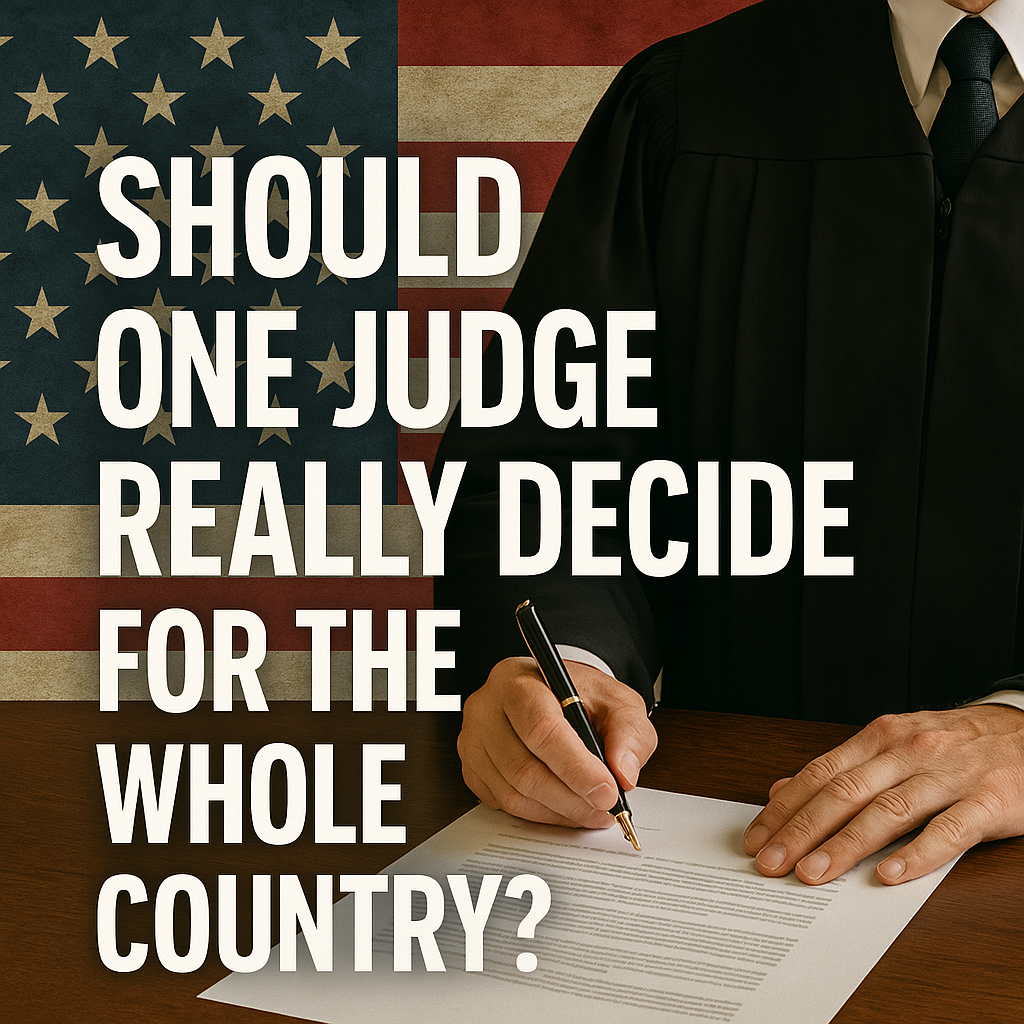You’re at a school board meeting. One parent raises their hand and says, “From now on, every school in the country has to follow what I say.”
You’d probably think, “That’s crazy! One person shouldn’t get to make the rules for everyone.”
Well, believe it or not, something kind of like that is happening in our courts.
Right now, federal district judges—who are supposed to handle cases just in their local areas—are making rulings that affect the entire United States.
This is worth watching, especially if you’ve wondered where federal district judges get their authority to issue universal injunctions. Hint: there is no such authority. They just do it. https://t.co/qkg1q7GuGp
— Brit Hume (@brithume) April 1, 2025
These are called nationwide injunctions, and they’re stirring up a big debate about fairness, freedom, and the proper role of judges.
What Is a Nationwide Injunction?
Say a new rule comes out from Washington, like a change to immigration policy or a vaccine mandate.
Someone in Texas or California sues, saying the rule is wrong or unconstitutional.
If the judge agrees, they can block the rule—but instead of just blocking it for the person who sued, they block it for the whole country.
That means one judge’s decision suddenly becomes the law of the land.
Even if the case hasn’t gone through appeals, even if it’s just one opinion, every American has to follow it.
This isn’t how the courts were meant to work. Many legal experts, especially conservatives, say this kind of power grab goes way too far.
Why This Matters
This isn’t just a bunch of lawyers arguing. This affects all of us.
When one judge can shut down a policy nationwide, it means:
-
People in other states don’t get a say.
-
Other judges don’t get a chance to weigh in.
-
The people we elect in Congress and the White House get overruled.
For example, during the first Trump administration, more than 60 nationwide injunctions were issued, stopping everything from immigration policies to health care reforms.
That’s more than any other president faced, according to a 2020 study from the Justice Department.
It’s not just about President Trump, either. Some conservative judges have blocked Biden policies the same way.
The problem is the system itself—because letting one judge call the shots for everyone just isn’t fair.
What the Critics Say
Some folks on the other side think these injunctions are useful.
They argue that if a law or policy is unconstitutional, it shouldn’t be allowed anywhere—not just in one state. They say this helps stop harm quickly and protect people’s rights.
But even some on the left admit this can be dangerous.
Calls for Action
People aren’t just complaining about it on social media—there’s a real push to do something about it.
Some lawmakers want to pass a law that says judges can only make rulings that apply to the people or groups involved in the lawsuit—not the whole country.
It’s kind of like saying, “If you have a problem with your neighbor’s fence, you can settle it in court—but you can’t make a rule about fences for the whole block.”
This is Why We Vote
In a country that values freedom, local control, and fair debate, it doesn’t sit right that one judge can stop a law for all 330 million of us.
That’s not how the Founders designed the system.
Judges are supposed to interpret the law—not run the country.
Whether you’re liberal or conservative, we should all be able to agree on this: big decisions should come from the people we elect, not from a single courtroom.
It’s time to rethink these nationwide injunctions and make sure our courts stick to their proper lane.
When judges do too much, the rest of us lose our say—and that’s not freedom. That’s overreach.
This article was written with the assistance of AI. Please verify information and consult additional sources as needed.




